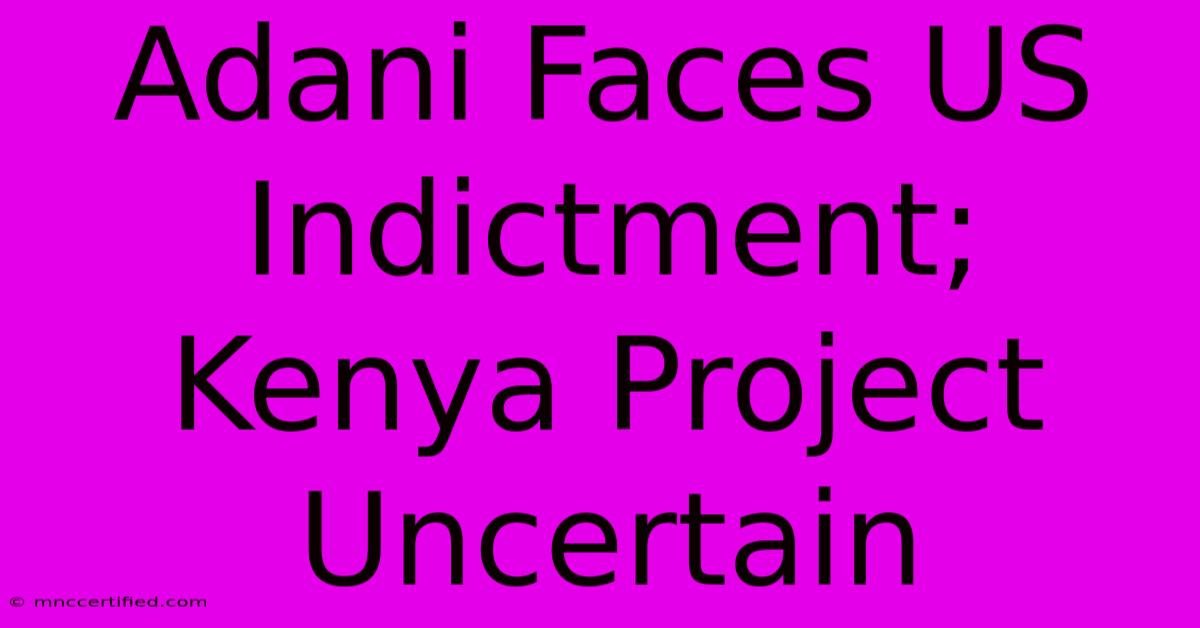Adani Faces US Indictment; Kenya Project Uncertain

Table of Contents
Adani Faces US Indictment; Kenya Project Uncertain
The Adani Group, a sprawling Indian conglomerate, is facing a significant hurdle with a recent US indictment, casting uncertainty over its ambitious projects, particularly the vital port development in Kenya's Lamu. This development has sent ripples through the global business community and raised serious questions about the future of infrastructure projects reliant on Adani's financial strength and global reach.
The US Indictment: A Blow to Adani's Reputation
The indictment, filed in a US court, alleges a complex scheme of stock manipulation and accounting fraud. While details are still emerging, the severity of the accusations cannot be understated. This legal challenge directly impacts Adani's credibility and financial stability, potentially affecting its ability to secure funding for future projects. The implications extend beyond the immediate legal battle, impacting investor confidence and potentially triggering a domino effect on its global operations.
Impact on Global Investment and Adani's Future
The indictment's timing is particularly critical, coinciding with several significant ongoing projects. The scale of the alleged fraud and the potential penalties could severely limit Adani's access to capital markets. This could lead to delays or even cancellations of planned infrastructure projects worldwide, jeopardizing billions in investments and impacting numerous stakeholders. Securing new funding will be a monumental challenge for Adani in the short term, especially given the negative publicity surrounding the indictment.
Kenya's Lamu Port: A Project in Limbo?
The Lamu Port project in Kenya, a cornerstone of the ambitious Lapsset Corridor project, is particularly vulnerable. Adani's involvement is central to the project's success, and any financial constraints faced by the conglomerate directly translate to potential delays or even a complete standstill for the Kenyan endeavor. This could have devastating consequences for Kenya's economic development plans, impacting job creation, regional trade, and the overall infrastructural development strategy.
Kenya's Economic Stakes and Potential Alternatives
The Lamu Port is not merely an infrastructure project; it's a strategic investment crucial for Kenya's economic growth. Its potential to transform regional trade and unlock economic opportunities is immense. However, the uncertainty surrounding Adani's future leaves Kenya with a significant challenge: finding alternative partners or restructuring the project to mitigate the risk associated with Adani's current legal predicament. This requires swift and decisive action from the Kenyan government to explore viable alternatives and safeguard national interests.
Looking Ahead: Uncertainty and the Road to Recovery (or Restructuring)
The Adani Group's future, and the fate of several significant infrastructure projects, remains uncertain in the wake of the US indictment. The legal battles will undoubtedly be protracted and complex, demanding considerable resources and attention. The outcome will significantly influence not only Adani's financial standing but also the prospects of projects like the Lamu Port, impacting several nations and economies.
The situation requires careful observation and analysis from both investors and governments. While the immediate outlook is clouded by uncertainty, the long-term implications will shape the landscape of global infrastructure development and international business relations for years to come. Transparency and accountability are paramount in navigating this challenging situation, ensuring that ethical considerations remain central to future project development and investment decisions.
Keywords: Adani Group, US indictment, stock manipulation, accounting fraud, Lamu Port, Kenya, Lapsset Corridor, infrastructure projects, global investment, economic development, investor confidence, financial stability, legal challenges.

Thank you for visiting our website wich cover about Adani Faces US Indictment; Kenya Project Uncertain. We hope the information provided has been useful to you. Feel free to contact us if you have any questions or need further assistance. See you next time and dont miss to bookmark.
Featured Posts
-
Juventus Vs Arsenal Womens Ucl Result
Nov 22, 2024
-
Icelands Grindavik Another Volcanic Eruption
Nov 22, 2024
-
Hermann Sons Life Insurance Cost
Nov 22, 2024
-
Cheap Car Insurance Owensboro Ky
Nov 22, 2024
-
Iceland Seventh Volcanic Eruption
Nov 22, 2024